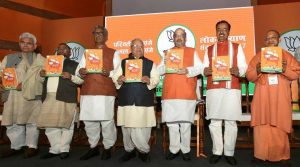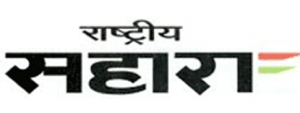
31-01-2017 (Important News Clippings)
To Download Click Here
नई विश्व व्यवस्था की संभावना
[ लेखक डॉ. विजय अग्रवाल, पूर्व प्रशासनिक अधिकारी हैं ]
इतिहास, फिल्म और आहत भावनाओं का सवाल
When a rumour about a fantasy sequence on an imaginary queen led to real violence
The assault on Bhansali and creative freedom

This violence visited upon Bhansali is, sadly, one of contemporary India’s most familiar scenes. Artists, writers and filmmakers are routinely punished for insulting a community’s honour, and its “icons”. Even scholarship and humour must be on constant guard. We like our historical figures super-sized and one-dimensional. Nobody important must be “shown in bad light”. We are afraid of our own shadows.
Why were the Karni Sena hoodlums so angry? Because the story of Delhi sultan Allauddin Khilji invading Chittor to possess its beautiful queen Padmini, and of Padmini choosing to immolate herself than submit, is deeply significant to them. Padmini is the conjuring of a Sufi poet’s imagination, there is no material evidence that she existed. Her story, though, has great folkloric power because of how it validates and ignites Rajput identity. When seen through a worldview where Hindu-Muslim enmity is the sole driver of all historical events, such stories seem all too real and resonant.
But for all the Karni Sena’s fierce feelings and bristling moustaches, this incident is a straightforward matter of vigilante violence. It’s not about history and fiction, or even freedom of expression; it is about the rule of law. This incident is another demonstration of the Indian state, the Vasundhara Raje Scindia government in this case, not being strong enough to hold the bully’s flying fists and protect other citizens. This happens over and over again, each incident encouraging the next. In Maharashtra, assorted senas and brigades have made a performance out of such assaults, enabled by the state; recall the rampage through the Bhandarkar Oriental Research Institute.
The demands made on movie-makers have been increasingly flimsy and absurd – Karan Johar was made to apologise for a character mentioning ‘Bombay’ in the slacker-comedy Wake Up Sid. An apolitical romantic drama like Ae Dil Hai Mushkil was attacked because a Pakistani actor was part of the cast, and a ‘compromise’ shabbily brokered by the state government. Any unwitting word can be an affront to someone, somewhere. And instead of refusing to watch the movie or book, or countering it with ideas of their own, the identity warriors use the might of the state to shut you down, or worse, simply hit out themselves.
That impoverishes all of us. It ensures that only the most bland and respectful art can circulate. It takes away the zest and freedom that is essential to creativity, it implants a small censor in your mind. Even in stated works of fiction, you can’t mess around, you can’t be subversive, you can’t be curious about complicated historical figures, you can’t tease apart myths, you can’t explore alternative possibilities. When all is holy, all is silent.
This is not to say that free speech is an utter and absolute value; hate speech that reinforces exclusion and prejudice can be reasonably contested in a diverse democracy. Only the most unrealistic laboratory liberals would object to peaceful demonstrations, drawing attention to your feelings, or petitioning the courts. But the problem is, our institutions rarely make that delicate judgment call, they simply give in to the loudest agitators, like the powerful upper-caste men leading the Karni Sena. All too often, from Wendy Doniger to James Laine, our courts aren’t balancing the values of free speech with full and fair democratic participation, they are simply acquiescing with the majority.
This time, though, Bhansali’s Bollywood colleagues have kept their differences aside and swung to his defence. This is rare – the movie industry, for all its persuasive power, liberal climate and cheerful diversity, has not pushed back often enough for such values. Perhaps Karni Sena is marginal enough for them to take a stand without worry, unlike the Senas in their neighbourhood, or perhaps this violence was truly the last straw. Either way, if even Karan Johar is moved enough to say “this cannot be our future”, there’s a flicker of hope for creative freedom.
Donald Trump’s travel ban give India a window to look at its own citizens
As protests roil American towns and foreign leaders respond with regret and reproach, in the wake of President Trump’s ban on travellers from seven Muslim-majority countries, and the world revisits the meaning of nations, citizenship, migration, globalisation and human rights, it would not be out of place for New Delhi to take another hard look at its own policies on Indian citizenship, not to speak of visas and migrants who trudge to India seeking economic and political refuge.
The Indian diaspora is huge, sprawling and multi-layered. Migrant labourers, students who left home to study abroad and went on to become entrepreneurs and professionals in foreign lands, the descendants of people indentured by the colonial government to work plantations on distant shores, traders who smelt opportunity and tagged along, young women who travelled abroad to join men who wanted desi brides, old parents who joined their offspring in their new homes, everyone takes citizenship of their adopted land as a natural course and right. But the obverse does not hold when it comes to people who apply for Indian citizenship.
The Times of India recently reported the demise of a priest who had spent 67 years of his life in India, working among tribal people in Raigarh, and had to wait for 38 years to get Indian citizenship after applying for it. Leave alone economic migrants who come into the country from across the border, and are looked upon as a threat, mitigating which by bundling them back to their homeland figures as an election promise and whips up chauvinistic passions in more than one state, even people who come to India because of an Indian spouse or because they are enchanted by India’s history and culture find it tough to obtain Indian citizenship.
Indians lay claim to a tradition of universality, of subsuming seeming difference in the commonality of people’s ultimate quest and destiny. It should inform India’s policy on granting citizenship, and of course, visas, then would indeed have some good come out of unmitigated nastiness in the US.
सौर ऊर्जा क्षेत्र की तस्वीर में बदलाव
राष्ट्रीय निवेश एवं बुनियादी ढांचा कोष सौर ऊर्जा क्षेत्र में एक बड़ा बदलाव लाने वाला साबित हो सकता है। इस संबंध में विस्तार से जानकारी दे रहे हैं विनायक चटर्जी
The promise makers
In this season of manifestoes that brim with tall pledges, parties must remember that voters don’t forget

The promises can be divided into two groups: Those before the announcement of elections and those after the announcement when the model code of conduct comes into play. Promises before the announcement of elections are the privilege of the ruling parties who belatedly remember the commitments they had made before the previous election but had forgotten conveniently. These may include subsidies, price cuts, reservations, new schemes, etc. The party is in a hurry to make such announcements before the model code of conduct kicks in. It does not seem to matter what damage the populist schemes would do to the economy of the state. The intelligentsia and economists start debating bad economics versus good politics. The verdict, however, is announced by the voters.
Promises of the second kind are the ones announced through the manifesto, released before or after the elections have been announced. These did not attract the model code of conduct — till recently. The Rs 2 kilo rice, free TVs, laptops, bicycles etc have all happened through this device. Ideally, the manifestoes should be announced immediately after the announcement of the poll schedule by the Election Commission. But the parties tend to wait till the very end so that they can out-promise their rivals. After the first manifesto is out, a fierce debate follows about the legality or propriety of the promises, besides the feasibility of their implementation. The EC is flooded with requests to declare them illegal.
The fact is that manifestoes are perfectly legal, even if their promises are unrealistic and irresponsible. The EC had no power to question these. The matter had gone to the Supreme Court which also found itself faced with a great dilemma. In its judgement of July 5, 2013, it accepted that the manifesto promises cannot be construed as “corrupt practices” under the Representation of the People Act though they do “influence” the people and “shake the roots of free and fair elections”. It directed the EC to frame guidelines with regard to the content of manifestoes in consultation with all the recognised political parties.
In their meeting with the EC, most political parties, as expected, vehemently opposed any regulation, arguing that, in a democracy, it is their “right and duty” towards voters to make such offers and promises through the manifestoes. Agreeing with this in principle, the EC, however, mentioned its “undesirable impact”. In deference to the SC directions, the EC issued guidelines for political parties to state the rationale for the promises in the manifestoes and the ways and means to meet the financial requirement for them. These guidelines were added to the model code of conduct as Part VIII.
On August 23, 2016, the AIADMK was “censured” for not giving a rationale and ways and means to meet financial requirements for a whole range of poll promises in its manifesto for the Tamil Nadu assembly election in 2016. This was held a violation of the guidelines on election manifestoes contained in Part VIII of the model code of conduct. On the same day, the DMK was also held guilty of not giving the rationale for the promises and ways and means to meet the financial requirements, though the party provided it to the EC subsequently in reply to its notice. It was “advised” to be careful in future. The manifesto being a perfectly legal and legitimate democratic instrument, if the promises are unrealistic or absurd, it is more important for the rival parties to expose the deceit. Even if the common voters do not understand that the promises are un-implementable, they do remember what promises were made at the last election and have not been fulfilled. Voters are now seen to be constantly rewarding good governance and punishing non-delivery.
A moot question is why the politicians have memory loss and forget their promises after the election, their minds becoming fertile with all the bright ideas for new schemes only around the next elections. Voters, gullible though they are, have come to understand it. Opposition parties and the ever alert media keep reminding them of forgotten or broken pledges. A contrarian view, however, is that promises like cheap foodgrain and free items of utility have done considerable good. With Rs 2 kg rice, starvation deaths don’t happen any more. The necessities/comforts of life which people could see only in their dreams now sometimes reach them. Distribution of bicycles in Bihar has improved enrolment and retention of girls in schools. Loan waivers for farmers have prevented many suicides. Employment guarantee schemes have brought visible relief to the rural poor (but scarcity of domestic help for the urban rich!).
The new reality is that with all the parties offering the same or similar freebies, the expected political advantage gets neutralised. Whichever party the people vote for, they will end up getting a similar package. Recently, Prime Minister Narendra Modi flagged the need for simultaneous elections. The reasons he gave were the disruption of the normal working of government and the enormous cost of the election to political parties and the government. One could add one more reason for this demand — too many elections mean too many populist promises that affect the economy.
ट्रंप का तुरुप
अमेरिकी राष्ट्रपति डोनाल्ड ट्रंप ने पदभार संभालने के साथ ही अपने चुनावी वादों पर अमल करना शुरू कर दिया है। सबसे पहले उन्होंने सात मुसलिम बहुल देशों के नागरिकों को अमेरिकी वीजा देने पर रोक लगा दी है। शरणार्थियों के अमेरिका आने पर अगले आदेश तक रोक लगा दी गई है। शनिवार को इससे संबंधित ट्रंप के कार्यकारी फैसले के बाद ही अमेरिकी प्रशासन ने कार्रवाई भी शुरू कर दी। हालांकि नागरिक अधिकारों के लिए काम करने वाले एक संगठन की याचिका पर वहां की अदालत ने ट्रंप के आदेश के विरुद्ध फैसला सुना दिया। इस पर ट्रंप ने कहा कि वे मुसलिम समुदाय के खिलाफ नहीं हैं, बल्कि सिर्फ मुसलिम आतंकवाद को रोकना चाहते हैं। मगर उनका यह तर्क किसी के गले नहीं उतर रहा। स्वाभाविक ही उनके इस फैसले पर अमेरिका सहित दुनिया भर में विरोध शुरू हो गया है। यहां तक कि गूगल जैसी कंपनियों ने भी इस पर आपत्ति जताई है। गौरतलब है कि चुनाव के समय ट्रंप ने कहा था कि मुसलिम समुदाय के लोगों की प्रोफाइलिंग होनी चाहिए, यानी उनके धर्म, नस्ल आदि के आधार पर तय होना चाहिए कि वे अमेरिका के लिए कितने सहयोगी हैं।
दरअसल, 9/11 के आतंकी हमले के बाद से ही अमेरिका में एक बड़ा तबका मुसलमानों को संदेह से देखता आ रहा है। उन्हें लगता है कि मुसलिम देश आतंकवादियों को पनाह देते हैं और वे सब अमेरिका के खिलाफ नफरत से भरे हैं। इसलिए विभिन्न देशों से अमेरिका गए बहुत सारे मुसलमान खुद को असुरक्षित महसूस करते रहे हैं। कई बार अनेक लोगों को सिर्फ इसलिए अमेरिकी प्रशासन की नाहक ज्यादतियों का सामना करना पड़ा कि उन्होंने दाढ़ी रखी थी या फिर वे मुसलिम थे। ऐसे में ट्रंप ने चुनाव प्रचार के समय मुसलिम समुदाय के खिलाफ कड़े कदम उठाने का वादा करके नस्लवादी भावनाओं को हवा दी थी। मुसलिम देशों के खिलाफ इस तरह भेदभावपूर्ण फैसला करके ट्रंप भले कुछ मुसलिम-विरोधी अमेरिकी लोगों की भावनाओं को तुष्ट करने में कामयाबी पा लें, पर इससे उनके लिए कई मुश्किलें पैदा होंगी।
ट्रंप ने भले सफाई दी हो कि वे मुसलिम समुदाय के खिलाफ नहीं हैं, पर शरणाथिर्यों के मामले में जिस तरह उन्होंने कहा कि ईसाइयों को प्राथमिकती दी जाएगी, उससे जाहिर है कि उनका कदम मानवीय आधार पर उचित नहीं है। यह ठीक है कि अमेरिका के विरुद्ध आइएसआइएस जैसे संगठन लगातार सक्रिय रहे हैं और वे मुसलिम समुदाय के युवाओं को बरगलाने में कामयाब होते रहे हैं, पर इसका यह अर्थ नहीं कि इस आधार पर मुसलिम देशों के सभी नागरिकों को संदिग्ध करार दे दिया जाए। बहुत-से लोग रोजगार, कारोबार, पढ़ाई-लिखाई के सिलसिले में अमेरिका आते-जाते रहते हैं। इसी तरह अमेरिकी लोगों को भी कारोबार आदि के सिलसिले में मुसलिम बहुल देशों का रुख करना पड़ता है। बहुत सारी अमेरिकी कंपनियों ने विभिन्न देशों में अपने कारोबार फैला रखे हैं। आश्चर्य नहीं, जब प्रतिबंधित मुसलिम बहुल देश भी प्रतिक्रिया में ऐसा ही कोई कदम उठाएं। इसलिए ट्रंप के ताजा फैसले से न सिर्फ मुसलिम देशों के लोगों, बल्कि अमेरिकी नागरिकों को भी परेशानियों का सामना करना पड़ेगा। फिर, ताजा फैसले से मुसलिम बहुल देशों में आतंकवाद को अपनी जड़ें और मजबूत करने का मौका मिल सकता है। इस तरह चरमपंथ के खिलाफ अमेरिका की लड़ाई बिखरने का भी अंदेशा बन सकता है। इसलिए आतंकवाद रोकने के लिए दूसरे व्यावहारिक तरीकों पर विचार किया जाना चाहिए।
विरोध का तर्क
जब-जब इतिहास को रूपहले पर्दे पर स्थान दिया गया है, उस पर विवाद भी हुआ है और विरोध भी। वैसे, इतिहास के आधार पर प्रचलित तयों और मान्यताओं को चुनौती देने में हमेशा जोखिम रहा है। संजय लीला भंसाली की फिल्म ‘‘पद्मावती’ के एक प्रेम दृश्य पर राजस्थान की राजपूत करणी सेना को इस कदर गुस्सा आया कि उसकी समर्थक टुकड़ी ने भंसाली पर हमला बोल दिया। राजस्थान के इतिहास से लेकर लोकगीतों में रानी पद्मावती का एक आत्मसम्मान से दीप्त नारी का आदरणीय स्थान रहा है। मेवाड़ के एक खास समुदाय के लोग उनसे अपना तादात्म्य स्थापित करते हैं। उनका मानना है कि पौराणिक आख्यानों और लोक-आस्थाओं में रचे-बसे चरित्र में अनर्गल छेड़छाड़ को क्रिएटिव फ्रीडम के नाम पर सही नहीं ठहराया जा सकता।
इतिहास है कि पति की वीरगति प्राप्त हो जाने के बाद खिलजी के हाथ पड़ने के बजाय पद्मावती ने आत्मसम्मान की रक्षा के लिए जौहर करना उचित समझा था। अब ऐसी इन्हीं पद्मावती को खिलजी के सपने में आता दिखाया गया है। यही बर्दाश्त नहीं हो रहा है। यह जन भावना है। पर जब कोई ऐतिहासिक तय कला में आता है तो उसके दूसरे पक्षों को भी देखना लाजिमी हो जाता है। स्वाभिमान की रक्षा का चुनाव पद्मावती का था, उसी तरह खिलजी को सपने देखने से कैसे रोका जा सकता है।
आखिर सपने देखना तो इंसानी फितरत है। इस पर पाबंदी कैसे लगाई जा सकती है। फिर अगर इतना बड़ा आक्रमण ही पद्मावती को पाने के लिए हो रहा है, ऐसे में उनका ख्याल भी खिलजी के मानस में आने को अस्वाभाविक कैसे कहा जा सकता है? यह न दिखाया या लिखा गया तो किरदार अधूरे और निर्जीव होंगे। यही लोक आस्था और कलात्मक ‘‘आजादी’ का वह बड़ा अंतर है, जिसको न समझने की वजह से विवाद हो रहा है। दूसरे यह कि सियासी राजनीति भी आग में घी डाल रही है। विवाद को सही परिप्रेक्ष्य में देखने की जरूरत है। यह मानते हुए कि विरोध करने की लक्ष्मण रेखा पार करने का हक किसी को नहीं है। प्रकारांतर से इस कांड ने राजस्थान की उस घोषित आदर्श संहिता की क्षति पहुंचाई है-पधारो म्हारे देश। इससे राजस्व का भी काफी नुकसान हुआ है जबकि यह बात फिल्म निर्देशक के साथ मिल बैठ कर सुलझाई जा सकती थी।






